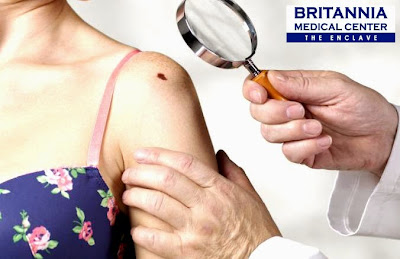May is National Skin Cancer Awareness Month and this time of year brings skin, our body’s largest organ, into focus as the weather warms up and people spend more time outside in the sun. Skin cancer is sometimes referred to as a “lifestyle disease” because its occurrence can be dramatically reduced through behavior modification, education, and early detection. Learning more about the disease and how it can be easily prevented and/or treated if found early, will hopefully inspire our readers to make some positive lifestyle changes and reduce their risk of skin cancer.
What is skin cancer exactly? Skin cancer is defined as the uncontrolled growth of abnormal skin cells. It occurs when unrepaired DNA damage to skin cells, most often caused by ultraviolet radiation from sunshine or tanning beds, triggers mutations, or genetic defects, that lead the skin cells to multiply rapidly and form malignant tumors.
Cancer of the skin is often divided into two categories: non-melanoma and melanoma. Melanoma, the more-serious form of skin cancer, is the most common form of cancer for young adults 25-29 years old and the second most common form of cancer for young people 15-29 years old. Furthermore, women aged 39 and under have a higher probability of developing melanoma than any other cancer except breast cancer, and up until age 40, significantly more women than men develop melanoma.
Current statistics show that skin cancer is the most common type of cancer in the United States, as well as some other countries, and unfortunately the incident rate continues to rise. Although the frequency of melanoma and non-melanoma skin cancer diagnoses indicate that this disease remains a significant health concern, it’s important to note that, research and public awareness campaigns are promoting prevention and early detection of skin cancer.
Here are eight tips from Britannia Medical Center-The Enclave on how to reduce your risk of getting skin cancer:
- Seek the shade, especially between 10 AM and 4 PM when sun's rays are strongest.
- Do not burn. A person’s risk for melanoma doubles if he or she has had five or more sunburns at any point in life.
- Avoid indoor tanning. UV radiation from tanning devices is now known to cause skin cancers. Those who make just four visits to a tanning salon per year can increase their risk for melanoma by 11%.
- Cover up. Clothing can be your most effective form of sun protection, so make the most of it with densely woven fabrics. Also don't forget to don a broad-brimmed hat and wear UV protective sunglasses.
- Use a broad-spectrum (UVA+UVB) sunscreen with an SPF of 30 or higher every day. For extended outdoor activity, use a water-resistant sunscreen and reapply throughout the day.
- Keep newborns out of the sun. Sunscreens may be used on babies over the age of six months, but they should also be protected by shade and clothing. Children are very sensitive to ultraviolet radiation—just one severe sunburn in childhood doubles the chances of developing melanoma later in life.
- Examine your skin head-to-toe every month. While self-exams should not replace the important, annual skin exam performed by a dermatologist, they offer the best chance of detecting the early warning signs of skin cancer. If you notice any change in an existing mole or discover a new one that looks suspicious, see a dermatologist immediately.
- See your Board Certified Dermatologist every year for a professional, full skin exam. Britannia Medical Center-The Enclave can help you. For more information call us at 0925-567-5329 • 0908-865-5662 • 0917-566-1932 • 458-0717 and schedule a consultation today.

No comments:
Post a Comment